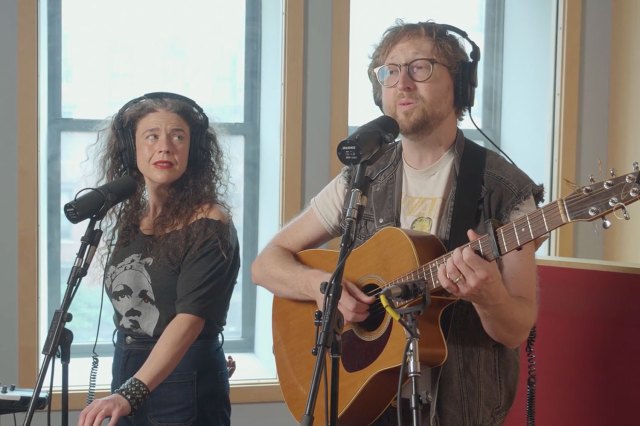Ghosts at Lyric Hammersmith Theatre – review
Gary Owen’s adaptation of the Ibsen classic, directed by Rachel O’Riordan, runs until 10 May

Anyone who saw Gary Owen’s devastating Iphigenia in Splott which brought Greek tragedy to Cardiff and turned the notion of sacrifice on its head, will know he is a man with a bold way with an old play.
He – and director Rachel O’Riordan – have pulled off the same trick with Henrik Ibsen’s Ghosts, transforming a haunted and haunting story of familial sin and grief into a wild roller-coaster ride of revelation and realisation. It’s funny, shocking, truthful and ultimately supremely moving.
There are clear problems with updating this particular classic, shifting it from its mid-Victorian setting to the present day. The starting point is more or less the same: a woman is endowing a charitable foundation – here a hospital for sick children – in the name of her late husband. As the play progresses the toxic reputation of that man emerges, the past lays its heavy hand on the present, and in the end, all is ashes.
When it was first performed in 1882, the play caused a scandal because of its treatment of syphilis, the way a son is literally cursed by his father’s legacy. Nowadays that particular problem could be solved with antibiotics, but Owen has cleverly altered the plot to make it just as disturbing and confronting in a contemporary setting.
What’s fascinating is watching this with an audience who don’t know what is coming. The vocal surprise as each twist emerges is sometimes unsettling, but there’s a sense of a vital drama being played out, not some historic masterpiece. It feels alive.
Merle Hensel creates a perfectly judged setting – the kind of anonymous living room inhabited by the super-rich, with a drinks table on one side, and a large sofa in the centre. The walls are papered in screen prints of a male presence, back to the camera, bald head, bull-like neck and broad shoulders looming like Alfred Hitchcock.

The picture window at the back is full of constant, swirling mist. This is both a literal depiction of the weather in this place – “except for two weeks in June” – and metaphorical, conjuring the sense that every character is groping for the truth about their own lives and feelings. Simisola Majekodunmi’s magnificent lighting and a sound design by Donato Wharton with music by Simon Slater chart the claustrophobic shifts in mood.
At the heart of this room is Victoria Smurfit’s Helena, widow of the Captain, benefactor of the hospital, owner of all she surveys. At first Smurfit is almost sphinx-like as she flings her arms across the sofa, self-possessed and mysterious, viciously in control as she argues with Andersen (Rhashan Stone), a trustee of her charity and an old flame, about whether her late husband’s “indiscretions” with young women now debar him from having a foundation in his name.
Gradually, though, the mood slips and spirals. Her disaffected son Oz (Callum Scott Howells) has come home, full of anger and hurt; her assistant Regina (Patricia Allison) wants a new job; Regina’s father Jacob (a growling, grounded Deka Walmsley) has his own agenda. Under it all, is the hurt and destruction wrought by the dead father, the need of each character to find their own hope amidst the wreckage he has created.
The long first act is supremely funny. Howells is magnificent as Oz, a failed actor with a “flair for the dramatic” who flounces and bites, but never entirely successfully hides his desperate longing for love. He lands each line – however surprising, however upsetting – with extraordinary panache, generating gasps and laughs in the same breath. “I’ve done something porn thinks isn’t OK,” he cries.
In the second half, the realisations are slower and more satisfying. What Owen’s version of this great play essentially examines is the effect on the survivors of living with a monster, whether a victim’s sense of what is acceptable becomes blurred. As the stakes rise, the play goes deeper, looking at trauma, guilt and forgiveness.
Each actor rises to the challenge: Stone walks a brilliantly controlled line between sanctimonious and sympathetic, Smurfit lets more and more grief emerge from her frozen control, Allison and above all Howells grapple painfully with a sense of lives ruined before they have even begun. O’Riordan’s taut direction never lets the tension, or the sense of wounded humanity slacken. I suspect Ibsen would have been proud.
















